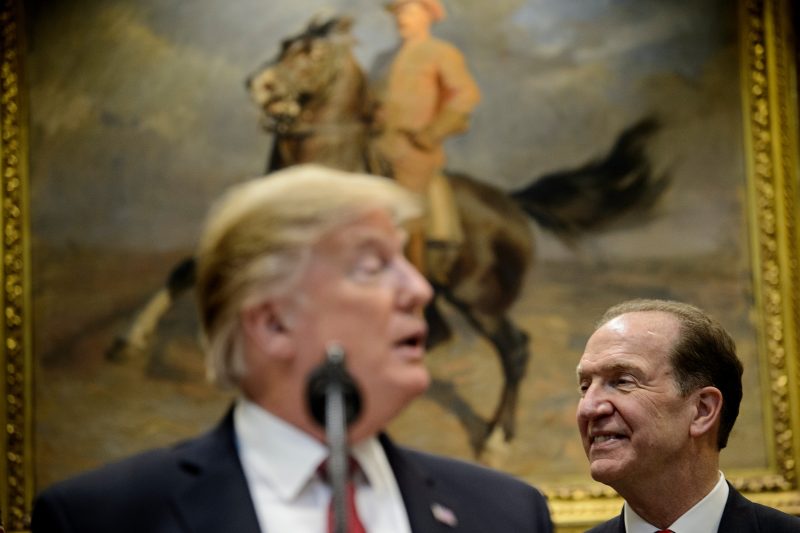Treasury’s Malpass aims to reform the World Bank
US President Donald Trump announces David Malpass as his candidate to lead the World Bank, saying he is the ‘right person’ to lead the institution (Brendan Smialowski)
Washington (AFP) – In his two years serving in the US Treasury, David Malpass has repeatedly lambasted the big development lenders as wasteful and ineffective, and called for reforms.
Now he is poised to take over the helm of the World Bank, where he can put his own stamp on its policies — something that many experts say undermines the institution.
President Donald Trump on Wednesday tapped Malpass to lead the World Bank, replacing Jim Kim who left February 1.
According to an unwritten rule, as the single largest shareholder, Washington gets to choose the leader, with the support of European nations.
Malpass, a 62-year-old US Treasury official in charge of international affairs, does not mince words.
Institutions such as the World Bank, he said in congressional testimony in 2017, “spend a lot of money” but are “not very efficient.”
“They are often corrupt in their lending practices and they don’t get the benefit to the actual people in the countries,” he said.
Malpass is tall and approachable but also viewed as brittle, with a direct manner bordering on abrasive.
By the middle of last year, about 20 career staff at Malpass’ office had quit, some of them chafing at his management style, according to media reports.
The Michigan native with a degree in physics completed studies in economics at George Washington University in the US capital. He then held several Treasury Department positions under former Republican presidents Ronald Reagan and George H.W. Bush.
He then began a lengthy stint at Bear Stearns — an investment bank that collapsed at the start of the 2008 financial crisis — including six years as its chief economist.
After the bank failed in 2008, he founded his own economics firm, Encima Global.
His policy positions and economic forecasts have had decidedly mixed results.
– ‘Don’t panic’ –
In 2007, the eve of the financial crisis, Malpass penned a Wall Street Journal op-ed telling readers not to “panic” because “housing and debt markets are not that big a part of the US economy.”
In 2010, as the Federal Reserve was pumping cash into markets, he signed onto a letter to Fed Chairman Ben Bernanke, calling for an end to the stimulus program, which he said would drive up inflation.
It did not.
That year, he also made a foray into politics, waging an unsuccessful campaign to become the Republican senator from New York.
He was an economic adviser to Trump’s presidential campaign in 2016.
Word of Malpass’ nomination has spurred controversy and, should he take office, his presidency would mark a sharp break with that of his predecessor, Jim Yong Kim.
Named by former President Barack Obama, Kim abruptly resigned last month, not even half way through his second five-year term.
Malpass favors reforms for World Bank that would lean more heavily on the private sector and lend less to high-growth economies like China that he says have sufficient access to credit already.
“Imagine what appointing Malpass would do to intellectual quality and morale at the World Bank,” economist and New York Times opinion columnist Paul Krugman wrote on Twitter.
“But I don’t know whether other countries will stand up to Trump on this.”
But Malpass told reporters that his concerns about lending to China were addressed in the reform package World Bank shareholders approved last year.
“China is the world’s second biggest economy so as it borrows from the World Bank it raises the question, Why is this having to happen?” he said, noting that he wants the bank to stick to its “graduation” policy for middle income countries.
Still, many experts expressed outrage, accusing Malpass of disdain for the World Bank’s poverty reduction mission.
“There is no case for Malpass on merit,” said Justin Sandefur, a senior fellow at the Center for Global Development, a development research organization in Washington.
“The question now is whether other nations represented on the World Bank’s board of governors will let the Trump administration undermine a key global institution.”
Disclaimer: This story is published from a syndicated feed. Siliconeer does not assume any liability for the above story. Validity of the above story is for 7 Days from original date of publishing. Content copyright AFP.


